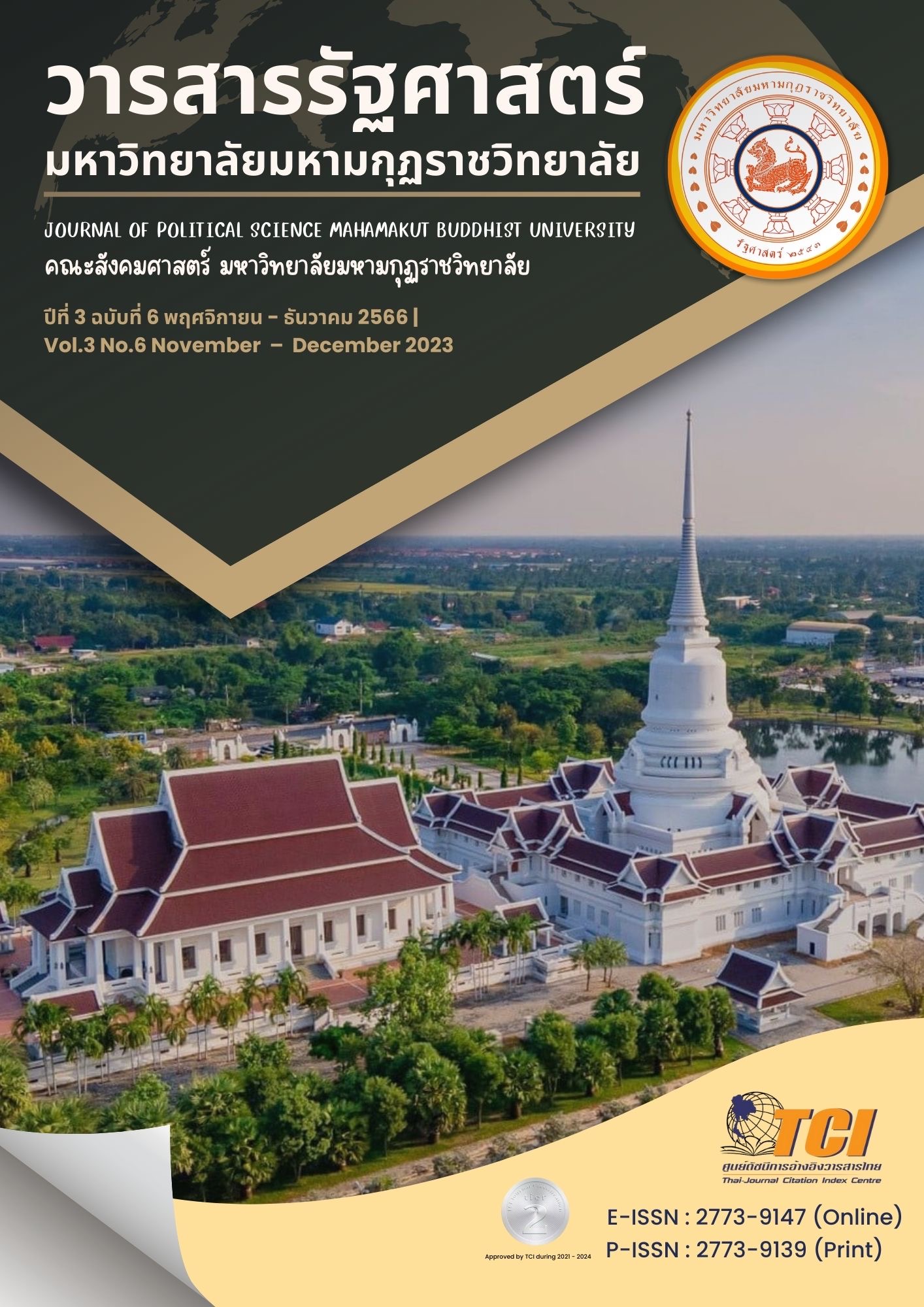PROMOTING THE PROCESS OF BUILDING KNOWLEDGE FOR PEOPLE TO EXERCISE THEIR RIGHT TO VOTE FOR MEMBERS OF THE HOUSE OF REPRESENTATIVES OF THAILAND
Main Article Content
Abstract
The right to vote for members of the House of Representatives is the basis of democracy. It serves as the cornerstone of civic participation and representation in the governance of the country. In Thailand, as in other democracies the effectiveness of this right depends on the voter having relevant knowledge about the candidate. their policy This article aims to explore strategies for enhancing the knowledge of the Thai people so they can make informed decisions in the elections to the House of Representatives. Several challenges facing Thai voters as well as access to unbiased and accurate information. disinformation and economic and social inequality that impedes knowledge acquisition. civil society organizations that affect election decisions Following successful practices in other democratic countries, several aspects have been proposed for promoting voter education. This principle emphasizes the need for civic education. media literacy and establishing fact-checking initiatives. It also supports a transparent election process and includes easily accessible policies and candidate profiles.
Article Details

This work is licensed under a Creative Commons Attribution-NonCommercial-NoDerivatives 4.0 International License.
References
จิรัชยา เคล้าดี, เชิงฐิภัทร์ เดชคุรฑธานนท์, ธีรวุฒิ ยุติธรรม, อนันต์ มะมิง, & มูฮัมมัดอัยมัน หะยีมะมิง. (2021). ปัจจัยที่มีผลต่อการตัดสินใจไปใช้สิทธิเลือกตั้งสมาชิกสภาผู้แทนราษฎรของประชาชนอำเภอหาดใหญ่ จังหวัดสงขลา. วารสารรัชต์ภาคย์, 15(41), 259-272.
ชัยวัฒน์ โยธี. (2017). ตัวแทนทางการเมืองในมิติวิถีประชาธิปไตยชุมชน. วารสาร มหาวิทยาลัยราชภัฏยะลา, 209-221.
ทวีศักดิ์ แสงเงิน. (2016). ปัจจัยที่มีอิทธิพลต่อการลงคะแนนเลือกตั้งสมาชิกสภาผู้แทนราษฎร ในการเลือกตั้งทั่วไป 2 กรกฎาคม 2554 ของเขตพญาไท กรุงเทพมหานคร. วารสารบัณฑิตศึกษามหาวิทยาลัยราชภัฏสวนสุนันทา, 2(1), 68-79.
ธงชัย สิงอุดม, จำนงค์ อดิวัฒนสิทธิ์, & สุรพล สุยะพรหม. (2022). การพัฒนารูปแบบวัฒนธรรมทางการเมืองแบบมีส่วนร่วมของประชาชนในพื้นที่จังหวัดเลย. วารสารวิจยวิชาการ, 5(2), 105-114.
นุชทยา คมวิริยะวุฒิ, สัณฐาน ชยนนท์, & วิจิตรา ศรีสอน. (2021). การมีส่วนร่วมในการเลือกตั้งสมาชิกสภาผู้แทนราษฎร ปี พุทธศักราช 2562 ของประชาชน ตำบลดอนปรู อำเภอศรีประจันต์ จังหวัดสุพรรณบุรี. Journal of Legal Entity Management and Local Innovation, 7(7), 41-49.
ปรัชญา บุตรสะอาด, พิรจักษณ์ ฉันทวิริยสกุล, & สุขสรร ทองที. (2023). การมีส่วนร่วมทางการเมืองของประชาชนตามรัฐธรรมนูญ. วารสารปราชญ์ประชาคม, 1(2), 71-88.
พงษ์ศักดิ์ อริยะสุนทรกุล, อภิชาติ ใจหาญ, & พระวิชาญ จูมครอง. (2022). การมีส่วนร่วมทางการเมืองของประชาชนในการเลือกตั้งสมาชิกสภา ผู้แทนราษฎรของประชาชนในเขตพื้นที่จังหวัดศรีสะเกษภายหลังการประกาศใช้รัฐธรรมนูญแห่งราชอาณาจักรไทย พุทธศักราช 2560. วารสารมจร อุบลปริทรรศน์, 7(1), 435-446.
ยุทธนา ปราณีต, อภิญญา ฉัตรช่อฟ้า, บวร ขมชุณศรี, กาญจนา ดำจุติ, & ปนัดดา รักษาแก้ว. (2020). อำนาจอธิปไตยกับแนวคิดว่าด้วยเจ้าของอำนาจและการแสดงออกของประชาชน. วารสาร มจร สังคมศาสตร์ปริทรรศน์, 9(2), 304-314.
ศิลปวิชญ์ น้อยสมมิตร. (2018). ประชาธิปไตยแบบสังคมไทย. วารสารวิจยวิชาการ, 1(3), 111-122.
เอกนรินทร์ ปิยะปัญญามงคล. (2021). แนวทางการส่งเสริมการมีส่วนร่วมทางการเมืองในการเลือกตั้งของนักศึกษาระดับปริญญาตรี มหาวิทยาลัยราชภัฏสวนสุนันทา. Journal of Legal Entity Management and Local Innovation, 7(6), 347-355.
Bovenkamp, H. M. V. D., & Vollaard, H. (2019). Strengthening the local representative system: the importance of electoral and non-electoral representation. Local Government Studies, 45(2), 196-218.
Dahl, R. A. (2008). Polyarchy: Participation and opposition. Michigan USA: Yale university press.
Diamond, L, & Morlino, L. (2005). Assessing the quality of democracy. Maryland USA: JHU Press.
Elisa Shearer, & Amy Mitchell. (2021, JANUARY 12). Pew Research Center. Retrieved August 14, 2023, from News Use Across Social Media Platforms: https://www.journalism.org/2019/10/02/news-use-across-social-media-platforms-2019/
Lupia, A., & McCubbins, M. D. (1998). The democratic dilemma: Can citizens learn what they need to know? Cambridge Umited Kingdom: Cambridge University Press.
Norris, P. (2013). The new research agenda studying electoral integrity. Electoral Studies, 32(4), 563-575.
Norris, P. (2015). Why elections fail. Cambridge United Kingdom: Cambridge University Press.


